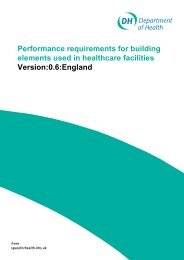Early Life Nutrition and Lifelong Health - Derbyshire Local Medical ...
Early Life Nutrition and Lifelong Health - Derbyshire Local Medical ...
Early Life Nutrition and Lifelong Health - Derbyshire Local Medical ...
Create successful ePaper yourself
Turn your PDF publications into a flip-book with our unique Google optimized e-Paper software.
BMA Board of ScienceAppendix 3: Current UK dietaryrecommendations for pregnancyBefore pregnancyA healthy diet is important at any time but particularly when planning a pregnancy. The Eatwellplate makes healthy eating easier. 249 Try to eat:• plenty of fruit <strong>and</strong> vegetables – aim for at least five portions a day• plenty of starchy foods• some milk <strong>and</strong> dairy foods• some meat, fish, eggs <strong>and</strong> other non-dairy sources of protein• just a small amount of foods <strong>and</strong> drinks high in fat <strong>and</strong>/or sugar.A 400g folic acid supplement should be taken daily from the time contraception is stopped untilthe 12th week of pregnancy. Women who have previously had a baby with neural tube defects, orwho are taking medication for diabetes, epilepsy or coeliac disease should take a 5mg supplement.DH guidelines on the consumption of alcohol state that women trying to conceive should avoiddrinking alcohol, but if they do choose to drink, to minimise the risk to the baby, they should notdrink more than one to two units of alcohol once or twice a week <strong>and</strong> should not get drunk.During pregnancyA healthy diet is important in pregnancy. There is no need to eat for two – it’s the quality not thequantity of the diet that’s important. Try to eat a variety of foods including:• plenty of fruit <strong>and</strong> vegetables – aim for at least five portions a day• plenty of starchy foods• plenty of iron-rich foods such as red meat, pulses, bread, green vegetables, <strong>and</strong> foods rich invitamin C that will help the iron to be absorbed• milk <strong>and</strong> dairy foods – these contain calcium• foods rich in protein such as lean meat, chicken <strong>and</strong> fish (aim for at least two portions of fisheach week including one of oily fish), eggs <strong>and</strong> pulses• fibre-rich foods such as wholegrain bread <strong>and</strong> cereals.Cut down on foods <strong>and</strong> drinks high in fat <strong>and</strong>/or sugar such as cakes <strong>and</strong> biscuits.A 400g folic acid supplement should be taken daily until the 12th week of pregnancy. Womenwho have previously had a baby with neural tube defects, or who are taking medication fordiabetes, epilepsy or coeliac disease should take a 5mg supplement.A 10g vitamin D supplement should be taken throughout pregnancy.Do not take dietary supplements that contain vitamin A such as fish liver oils, <strong>and</strong> avoid liver <strong>and</strong>liver-containing products.Caffeine-containing drinks should be consumed in moderation to limit caffeine intake to less than200mg a day (equivalent to two mugs of instant coffee, two mugs of tea or five cans of cola).Avoid paté, certain cheeses <strong>and</strong> raw or partially cooked eggs, shellfish <strong>and</strong> meats, <strong>and</strong>unpasteurised milk.DH guidelines on the consumption of alcohol state that pregnant women should avoid drinking alcoholbut if they do choose to drink, to minimise the risk to the baby they should not drink more than one totwo units of alcohol once or twice a week <strong>and</strong> should not get drunk. The BMA believe that the onlysensible message for women who are pregnant must be complete abstinence from alcohol.<strong>Early</strong> life nutrition <strong>and</strong> lifelong health 69



